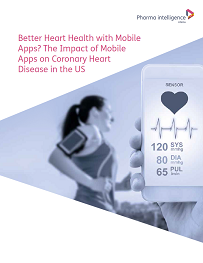
Free Report
Better Heart Health with Mobile Apps? The Impact of Mobile Apps on Coronary Heart Disease in the US
September 26, 2018
Heart diseases are one of the leading causes of death across the world, especially in middle- and high-income countries. According to the World Heart Federation, heart diseases were responsible for almost 17.7 million deaths in 2016. In the US, deaths related to heart diseases numbered 633,840 in 2017, and the associated disability-adjusted life years (DALYs) were 3,821 per 100,000 persons in 2016. Coronary heart disease (CHD) is one of the most common heart diseases, and occurs as a result of clogged arteries or atherosclerosis, with rupture of an atherosclerotic plaque causing blood ,clots, which are the leading cause of a heart attack. Worldwide deaths related to CHD were 7.4 million in 2015. However, while prevalent cases and deaths associated with heart diseases are slowly stabilising, the associated economic impact is increasing. According to the US Centers for Disease Control and Prevention (CDC), the economic costs of heart diseases are now over $317bn every year.<br><br> In this paper, Datamonitor Healthcare shares the findings of an analysis of the US Behavioral Risk Factor Surveillance System (BRFSS), specifically assessing the most recent data on self-reported CHD, and its risk factors. BRFSS has become a powerful tool for measuring adult health; its results are used for targeting different health risk groups and encouraging health promotion activities (such as increasing physical activity). This paper also looks at several health apps targeting CHD and other heart disease risk factors. It provides a perspective of how these apps can play a larger and more meaningful role by empowering individuals to be more active in monitoring and managing their conditions and treatment.<br><br> The identification of risk factors and risk factor modification strategies is essential in the prevention and management of CHD and other heart diseases. The most important risk factors for heart diseases are unhealthy diet, physical inactivity, tobacco use and alcohol consumption. The effects of these behavioural risk factors present as hypertension, high cholesterol, diabetes and overweight and obesity. According to the World Health Organization (WHO), 80% of heart diseases are preventable if these risk factors were eliminated.<br><br> Mobile phones have become an integral part of our lives, and in recent years the utilisation of mobile apps has increased greatly and is expected to grow further. The global mobile health app market is valued at $28.32bn in 2018, and some project it to reach $102.35bn by 2023. In terms of health-related apps, there are thousands of different offerings with the aim of improving health measures and disease outcomes through behaviour modification. According to research conducted in 2017, only 32% of global mobile health app market stakeholders were pharma companies, hospitals or health insurance companies.
